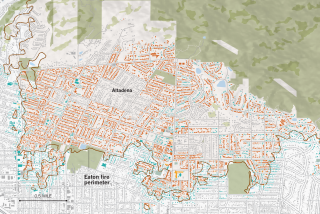Column: DNA database could help predict your disease — then get you fired
- Share via
Relatively little attention was paid last year when President Obama called for creation of a database containing the DNA of a million volunteers as part of moves toward “precision medicine,” or tailoring healthcare to people’s individual needs.
But to many in the healthcare field, Obama’s embrace of a national repository of genetic information was seen as a turning point in advancing use of “big data” to reduce medical costs and improve people’s well-being by anticipating disorders before they become serious problems.
The benefits of such a system seem obvious. Algorithms would piece together clues from doctor, hospital and drugstore claims, as well as other information such as social media postings, and alert physicians if it appears that a patient is at greater risk of a disease or a chronic condition.
But questions remain about safeguarding people’s privacy and how such information might be used.
“Precision medicine gives us one of the greatest opportunities for new medical breakthroughs we’ve ever seen,” Obama said. He also said that “privacy will be built in from Day One.”
Healthcare ethicists aren’t so sure.
“Big data and precision medicine might be good for society, but it could harm individuals,” said Dr. Joseph Fins, head of the Division of Medical Ethics at Weill Cornell Medical College. “We have to find a balance.”
What happens, for example, when your insurer determines that out you’re predisposed for a chronic disease? Does your employer have a right to such information? What are the individual’s responsibilities once he or she is informed of a potential illness?
Fins said that while medical-privacy laws are already on the books, technology is rapidly outpacing existing regulations.
“We have to be very careful about this,” he said. “We want to be able to identify healthcare conditions before they become diseases — that’s a really good thing. The question is whether such data will be so omnipresent that we’re looking at a Big Brother situation.”
In Tuesday’s column I wrote about how the Centers for Medicare and Medicaid Services recently signed a nearly $92-million contract with defense industry giant Northrop Grumman for the second phase of a computer system intended to reduce fraudulent claims and anticipate beneficiaries’ medical issues.
Private insurers also are investing heavily in so-called predictive analytics, with a goal being to use big data to inform doctors that a patient may be in need of closer scrutiny.
Ariel Bayewitz, Anthem’s vice president for provider management analytics, told me that leading insurers already are sharing data with one another. Dr. Shantanu Agrawal, director of Medicare’s Center for Program Integrity, said the federal system is keen to share its big data findings with others in the healthcare community.
In a best-case scenario, all this data collection and sharing will offer a head start in spotting and addressing larger healthcare trends, such as the opioid epidemic now sweeping the nation, and provide for the medical breakthroughs envisioned by the president.
The darker possibility, however, is a disturbing prospect of genetic haves and have-nots, and of discrimination based not on race, age or gender but on health.
The federal Genetic Information Nondiscrimination Act of 2008 was intended to head off such concerns. It prevents insurers and employers from treating people differently because of indications in their DNA that suggest a possibility of illness.
“Everyone should care about the potential for genetic discrimination,” says the government’s National Human Genome Research Institute, which monitors growing use of genetic data. “Every person has dozens of DNA differences that could increase or decrease his or her chance of getting a disease such as diabetes, heart disease, cancer or Alzheimer’s disease.”
But healthcare experts worry that the law’s provisions are quickly becoming outdated, just as telecommunications rules written for the age of telephones have been stretched to the breaking point by the Internet.
“Every citizen should want this data to be private and secure,” said Medicare’s Agrawal. “We’re trying to usher in the future but to also do it in a thoughtful manner.”
My sense is that when it comes to big data and healthcare, we don’t know what we don’t know. That is, the full benefits and dangers will become apparent only as these systems are brought online and start to interact.
On the one hand, I agree with Ezekiel Emanuel, chairman of the University of Pennsylvania’s Department of Medical Ethics and Health Policy, who told me that big data and precision medicine are vital because “you have to figure out who’s sick, who’s sicker and who’s likely to be sick.”
This, he said, is “critical to delivering healthcare efficiently and effectively.”
See the most-read stories in Business this hour »
But I also agree with Gerard Magill, a professor of healthcare ethics at Duquesne University in Pittsburgh, who likened healthcare big data to services such as Google and Facebook. Yes, they’ve changed society for the better in some ways, but the price has been forfeiture of a great deal of personal privacy.
“Privacy, I’m afraid, we’re just going to have to get real — it’s gone,” he said.
The important thing is that we don’t enter this Brave New World all starry-eyed and cheerful. We need to be vigilant and prepared to adopt new protections as soon as the pitfalls are known.
Remember that DNA database Obama called for last year? The Mayo Clinic in Minnesota recently was awarded $142 million in taxpayer funds to get it up and running.
The future is now.
David Lazarus’ column runs Tuesdays and Fridays. He also can be seen daily on KTLA-TV Channel 5 and followed on Twitter @Davidlaz. Send your tips or feedback to [email protected].
MORE BUSINESS NEWS
How I Made It: Ellen Chen and Mario Del Pero built Mendocino Farms by learning from mistakes
Wells Fargo must do more than fire its CEO to mend its image, critics say
Yahoo’s data breach may impact its $4.83-billion deal to sell to Verizon







